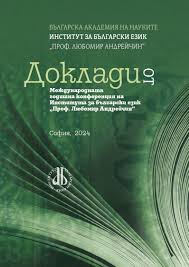Чуждоезикови интерференции в диахронната българска роднинска терминология
Foreign language interferences in the diachronic Bulgarian kinship terminology
Author(s): Mariyana Tsibranska-Kostova
Subject(s): Language studies, Language and Literature Studies, Theoretical Linguistics, Applied Linguistics, Lexis, Semantics, Historical Linguistics, Descriptive linguistics, South Slavic Languages, Philology
Published by: Институт за български език „Проф. Любомир Андрейчин“, Българска академия на науките
Keywords: Bulgarian kinship terminology; Turkish loanwords
Summary/Abstract: This article focuses on the extracted lexical information about the use of the Turkish kinship terms badjanak and abla in the 17th century manuscript RNL ОR Pogod. 243 from the Russian National Library in St.Petersburg. Both function as variants in the southern Slavic translation of Zacharias Scordilius Marafara’s work on degrees of kinship and forbidden marriages, printed in 1563 and 1588 in Venice. The comparison with the Slavonic copy of the same Greek work, preserved partially in the Bulgarian manuscript CIAI 1160 from the Library of the St. Synod of the Bulgarian Orthodox Church in Sofia, allows the formation of the word-pair баджанак – пашеног ‘husband to wife’s sister; each of the sisters’ spouses‘, while абла (written аcла) replaces the kinship term леля ‘аunt’. The examples testify to the entry of the colloquial speech in the semantic field of kinship among Bulgarians and South Slavs. Thus a bridge is created between dialects and literary language, between the areal use of the terms and their written fixation. Specific data complement the characteristics of the modern Bulgarian language, which first stage of development is the period 15th – 17th cc.
- Page Range: 109-114
- Page Count: 6
- Publication Year: 2024
- Language: Turkish, Bulgarian
- Content File-PDF

